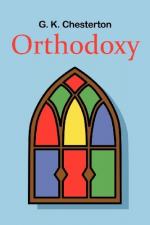
|
1. In Chapter I, Introduction in Defense of Everything Else, Chesterton states that the book is written from his own experiences rather than as the result of research and labor. What expectations does this set up or destroy for the reader?
Chesterton notes that Orthodoxy was written as the result of his personal search for truth rather than a studious account of Christian apologetics. This sets the reader up for an accessible book, something the lay reader can more easily understand. Chesterton's approach speaks to anyone searching for the truth or even curious, just as he was. The reader does not need any special education in order to understand the book; Chesterton's audience was the general populace. This makes his argument even more convincing because he doesn't use the Bible as an authority to prove that Christianity is right. He uses his own study and observance of the world around him, which all people can see and examine for themselves.
(read all 60 Short Essay Questions and Answers)
|
This section contains 7,865 words (approx. 27 pages at 300 words per page) |

|




